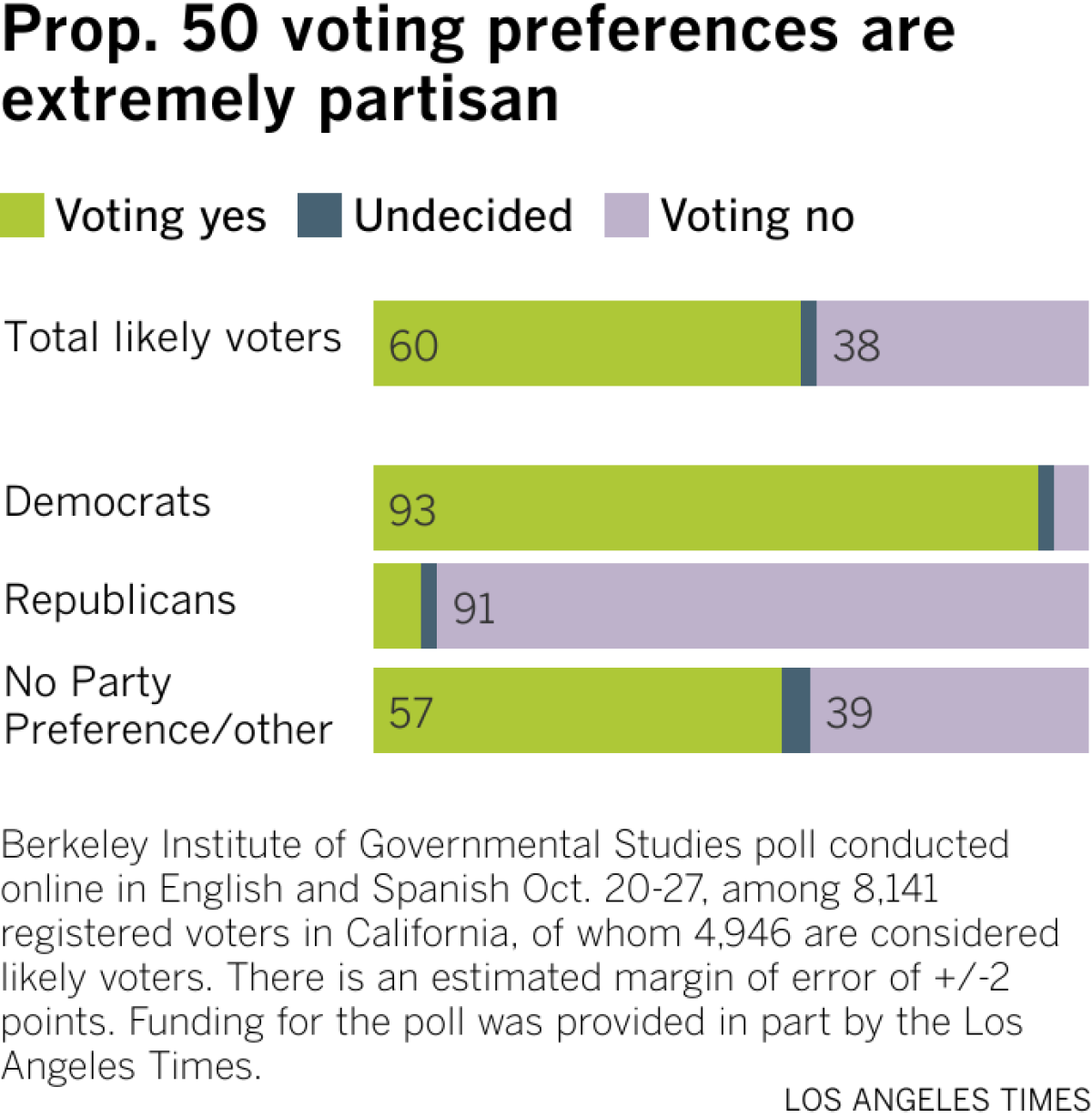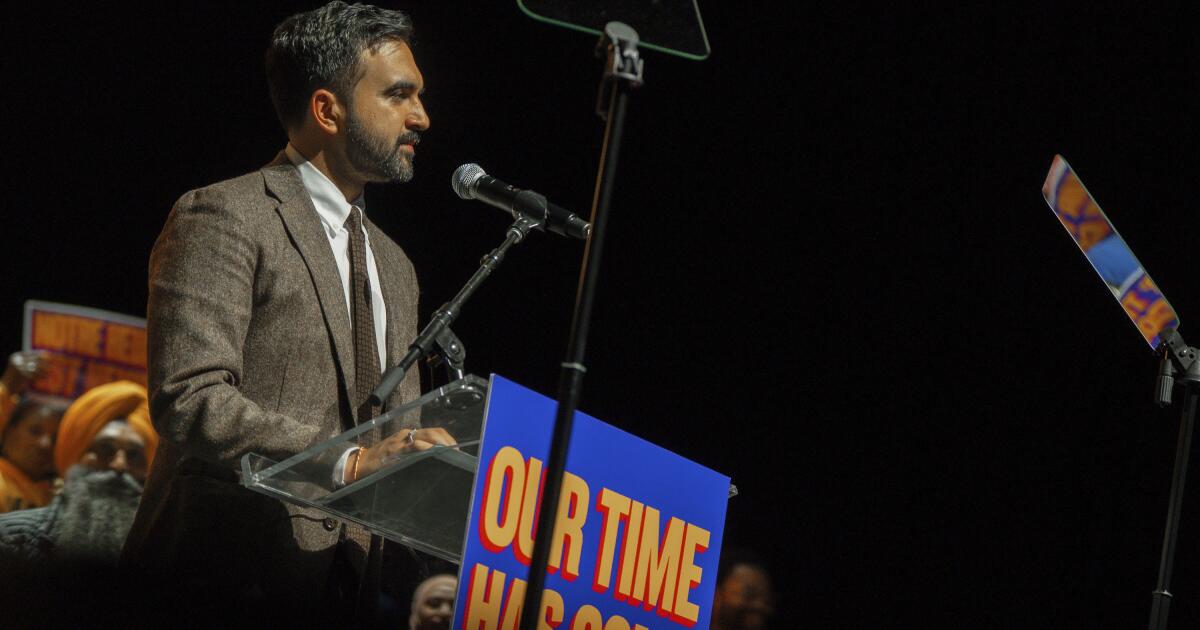Voters in poll side with Newsom, Democrats on Prop. 50
A Nov. 4 statewide ballot measure pushed by California Democrats to help the party’s efforts to win control of the U.S. House of Representatives and stifle President Trump’s agenda has a substantial lead in a new poll released on Thursday.
Six out of 10 likely voters support Proposition 50, the proposal by Gov. Gavin Newsom and his allies to redraw the state’s congressional districts to try to increase the number of Democrats in Congress, according to a survey by UC Berkeley’s Institute of Governmental Studies that was co-sponsored by The Times. About 38% of likely voters oppose the ballot measure.
Notable in an off-year special election about the arcane and complicated process of redistricting, 71% of likely voters said they had heard a significant amount of information about the ballot measure, according to the poll.
“That’s extraordinary,” said Mark DiCamillo, director of the IGS poll. “Even though it’s kind of an esoteric topic that doesn’t affect their daily lives, it’s something voters are paying attention to.”
That may be because roughly $158 million has been donated in less than three months to the main campaign committees supporting and opposing the measure, according to campaign fundraising reports filed with the state last week. Voters in the state have been flooded with political ads.
Californians watching Tuesday night’s World Series game between the Los Angeles Dodgers and the Toronto Blue Jays saw that firsthand.
In the first minutes of the game, former President Obama, Newsom, Massachusetts Sen. Elizabeth Warren and other prominent Democrats spoke in favor of Proposition 50 in an ad that probably cost at least $250,000 to air, according to a Democratic media buyer who is not associated with the campaign.
According to the survey, the breakdown among voters was highly partisan, with more than 9 out of 10 Democrats supporting Proposition 50 and a similar proportion of Republicans opposing it. Among voters who belong to other parties, or identify as “no party preference,” 57% favored the ballot measure, while 39% opposed it.
Only 2% of the likely voters surveyed said they were undecided, which DiCamillo said was highly unusual.
Historically, undecided voters, particularly independents, often end up opposing ballot measures they are uncertain about, preferring to stick with the status quo, he said.
“Usually there was always a rule — look at the undecideds in late-breaking polls, and assume most would vote no,” he said. “But this poll shows there are very few of them out there. Voters have a bead on this one.”
In the voter-rich urban areas of Los Angeles County and the San Francisco Bay area, Proposition 50 led by wide margins, the poll found. Voters in Orange County, the Inland Empire and the Central Valley were pretty evenly divided.
Redistricting battles are underway in states across the nation, but California’s Proposition 50 has received a major share of national attention and donations. The Newsom committee supporting Proposition 50 has raised far more money than the two main committees opposing it, so much so that the governor this week told supporters to stop sending checks.
The U.S. House of Representatives is controlled by the GOP but is narrowly divided. The party that wins control of Congress in the 2026 midterm elections will determine whether Trump can continue enacting his agenda or whether he is the subject of investigations and possibly another impeachment effort.
California’s 52 congressional districts — the most of any state — currently are drawn by a voter-approved independent commission once every decade following the U.S. census.
But after Trump urged GOP leaders in Texas this summer to redraw their districts to bolster the number of Republicans in Congress, Newsom and other California Democrats decided in August to ask voters to allow a rare mid-decade partisan redrawing of the state’s district boundaries. If passed, Proposition 50 could potentially add five more Democrats to the state’s congressional delegation.
Supporters of Proposition 50 have painted their effort as a proxy fight against Trump and his policies that have overwhelmingly affected Californians, such as immigration raids and the deployment of the National Guard on the streets of Los Angeles.
Opponents of the proposition have focused on the mechanics of redistricting, arguing the ballot measure subverts the will of California voters who enacted the independent redistricting commission more than a decade ago.
“The results suggest that Democrats have succeeded in framing the debate surrounding the proposition around support or opposition to President Trump and national Republicans, rather than about voters’ more general preference for nonpartisan redistricting,” Eric Schickler, co-director of IGS, said in a statement.
Early voting data suggest the pro-Proposition 50 message has been successful.
As of Tuesday, nearly 5 million Californians — about 21% of the state’s 23 million registered voters — had cast ballots, according to trackers run by Democratic and Republican strategists.
Democrats greatly outnumber Republicans among the state’s registered voters, and they have outpaced them in returning ballots, 52% to 27%. Voters who do not have a party preference or who support other political parties have returned 21% of the ballots.
The Berkeley/L.A. Times poll findings mirrored recent surveys by the Public Policy Institute of California, CBS News/YouGov and Emerson College.
Among voters surveyed by the Berkeley/L.A. Times poll, 67% of Californians who had already voted supported Proposition 50, while 33% said they had weighed in against the ballot measure.
The proposition also had an edge among those who planned to vote but had not yet cast their ballots, with 57% saying they planned to support the effort and 40% saying they planned to oppose it.
However, 70% of voters who plan to cast ballots in person on Nov. 4, election day, said they would vote against Proposition 50, according to the poll. Less than 3 in 10 who said they would vote at their local polling place said they would support the rare mid-decade redistricting.
These numbers highlight a recent shift in how Americans vote. Historically, Republicans voted by mail early, while Democrats cast ballots on election day. But this dynamic was upended in recent years after Trump questioned the security of early voting and mail voting, including just recently when he criticized Proposition 50.
“No mail-in or ‘Early’ Voting, Yes to Voter ID! Watch how totally dishonest the California Prop Vote is! Millions of Ballots being ‘shipped,’” Trump wrote on his social media platform, Truth Social. “GET SMART REPUBLICANS, BEFORE IT IS TOO LATE!!!”
GOP leaders across the state have pushed back at such messaging without calling out the president. Urging Republicans to vote early, they argue that waiting to cast ballots only gives Democrats a greater advantage in California elections.
Among the arguments promoted by the campaigns, likely voters agreed with every one posited by the supporters of Proposition 50, notably that the ballot measure would help Democrats win control of the House, while standing up to Trump and his attempts to rig the 2026 election, according to the poll. But they also agreed that the ballot measure would further diminish the power of the GOP in California, and that they didn’t trust partisan state lawmakers to draw congressional districts.
The Berkeley IGS/Times poll surveyed 8,141 California registered voters online in English and Spanish from Oct. 20 to 27. The results are estimated to have a margin of error of 2 percentage points in either direction in the overall sample, and larger numbers for subgroups.

